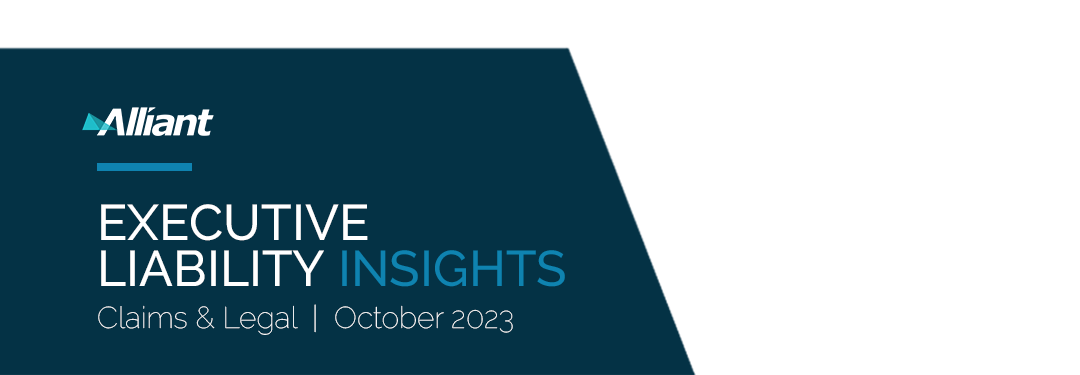
SECURITIES CORNER
WHEN MAKING STATEMENTS ABOUT A COMPANY’S “DNA” COMPOSITION, ASSET MANAGERS RISK THE SEC-TESTING


One of Europe’s largest asset manager firms (the “Company”) attracted the U.S. Securities and Exchange Commission’s (the “SEC”) magnifying glass, when one of its former sustainability leaders was dismissed for reportedly blowing the whistle on the company’s inflated sustainability claims. As a result, the Company allocated substantial funds to cover an SEC settlement related to environmental, social, and governance (“ESG”) factors and Anti-Money laundering (“AML”) violations, despite neither admitting nor denying the allegations.
The allegations revolved around the Company’s failure to adhere to its own policy of implementing ESG provisions when providing services to investors. The Company’s director of the SEC enforcement even went as far as to state that ESGs were a part of the Company’s “DNA,” all while the company was violating the advertised investment processes. Furthermore, poor documentation of compliance with ESG integration policies revealed inconsistencies, yet the Company’s website continued to display advertisement that misled the investors about the Company’s ESG practices.
According to the SEC’s allegations, some professionals underwent ESG compliance training and learned to integrate the Company’s ESG policy into their services, yet others were blissfully unaware of the ESG policy. This lack of proper controls to ensure compliance with the Company’s policies, particularly when senior managers were unable to determine whether ESG risk factors were incorporated in investment decision-making processes, further contributed to the SEC’s concerns.
As a consequence of these SEC allegations, the company incurred significant financial losses and settled the matter with the SEC.
SEC EXPANDS THE NAMES RULE TO INCLUDE MORE INVESTMENT FUNDS TO AVOID FURTHER GREENWASHING


Recently, the SEC adopted new amendments to the two-decade-old regulation known as the “Names Rule,” which will bring more investment funds under the regulation of the SEC. The purpose of the Names Rule is to ensure that registered funds do not use names that are deceptive or inconsistent with their investments. The new amendments will require investment funds to put 80% of their assets toward the cause suggested by their name. For example, the increased regulations are expected to affect the funds with names signifying a particular focus or characteristic, funds that incorporate one or more environmental, social, or governance (“ESG”) factors into their investment decisions, and those that use terms “sustainable,” “green,” or “socially responsible” and alike.
The amendments aim to promote truth in advertisement and prevent “greenwashing,” the practice of claiming that one’s practices, products, or services are more environmentally friendly or sustainable than they really are. The SEC noted that the amendments will provide investors with clarity. The amendments should also enhance investing experience at a time when the increasing popularity of ESG investment products has been accompanied by a “concerning” trend in disclosures that “fail to accurately support the underlying investment.” The amendments will become effective for all registered funds, including existing funds, 60 days after publication of the final rule in the Federal Register, depending on the fund’s size
SEC’S DIVISION OF EXAMINATION OUTLINES ITS PROCESS FOR SELECTING ADVISERS


The SEC recently issued a risk alert, which outlined the factors the SEC will take into consideration when selecting registered investment advisers (“Advisers”) to examine. These examinations are a part of the SEC’s risk-based approach that is meant to adapt to market changes, industry practices, and investor preferences.
The alert provided the process for selecting Advisers, how the SEC determines the focus area of the exam, and the documents required from the Adviser. The purpose of this alert is to provide Advisers with the risks and issues the SEC has identified so Advisers can prepare if they are selected for an examination as well as assist firms in their compliance efforts.
An Adviser may be chosen for an examination based on 1) the firm’s risk characteristics; 2) tips, complaints, or referrals about a firm; and 3) the SEC’s interest in a particular compliance risk area. The SEC outlines which firm-specific risk characteristics they may take into consideration when making their determinations which include, but are not limited to, conflicts of interests, an Adviser’s particular business activities, and regulatory history.
Prior to their examinations, the SEC will typically send each Adviser a letter notifying them of the examination and provide them with an initial list of requested information, including documents that the SEC intends to review. The initial information requested would likely consist of general inquiries regarding the adviser’s business, compliance risks, and written policies and procedures.
The purpose of the examinations is to assess an Adviser’s risk, potential conflicts, and overall compliance. Now, with the SEC’s specific parameters regarding examinations, each Adviser can properly prepare itself for such an examination.
NEW AMENDMENTS FOR GOVERNING BENEFICIAL OWNERSHIP AIMED AT IMPROVING TRANSPARENCY FOR SHAREHOLDERS AND THE MARKET


Recently, the SEC adopted several amendments that govern beneficial ownership reporting. The purpose of the new rules was to shorten the deadlines for Schedule 13D and Schedule 13G filings from 10 business days to 5 business days, clarify the disclosure and beneficial ownership requirements as they relate to derivative securities, and provide some direction on “group” formation. The amendments will also extend the “cut-off” time for submitting Schedule 13D and Schedule 13G filings from 5:30 p.m. to 10 p.m., Eastern time. Additionally, all disclosures, other than exhibits, will be required to use a structured, machine-readable data language. Lastly, the new amendments will become effective 90 calendar days after publication in the federal register.
|
Director/Officer |
Role |
Company |
|
Guosheng Qi |
CEO |
Gridsum Holding, Inc. |
|
Mina Tadrus |
Founder |
Tadrus Capital LLC |
|
Dharma Teja Nukarapu |
Founder / CEO |
SharkDreams, Inc. |
|
Nima Golsharifi |
CEO |
NDB, Inc. |
|
Donal R. Schmidt, Jr. |
CEO |
Rapid Therapeutic Science Laboratories, Inc. |
|
Chauncey Forbush Lufkin III |
CCO |
Lufkin Advisors, LLC |
|
Michael Caridi |
Director |
Tree of Knowledge International Group |
|
Director/Officer |
Role |
Company |
|
Guosheng Qi |
CEO |
Gridsum Holding, Inc. |
|
Mina Tadrus |
Founder |
Tadrus Capital LLC |
|
Dharma Teja Nukarapu |
Founder/CEO |
SharkDreams, Inc. |
|
Nima Golsharifi |
CEO |
NDB, Inc. |
|
Donal R. Schmidt, Jr. |
CEO |
Rapid Therapeutic Science Laboratories, Inc. |
|
Chauncey Forbush Lufkin III |
CCO |
Lufkin Advisors, LLC |
|
Michael Caridi |
Director |
Tree of Knowledge International Corp. |
SEPTEMBER 2023 NOTEWORTHY SETTLEMENTS AND JUDGMENTS
|
Amount |
Director/Officer |
Role |
Company |
|
$15,802,376 |
Seong Yeol Lee |
CEO |
Ameritrust |
|
$846,551 |
Michelle Silverstein |
Officer |
Esos Rings, Inc. |
|
$1,922,621 |
Douglas MacWright |
CEO |
Highlander Capital Management, LLC |
|
$25,300,000 |
Craig M. Knight |
CEO |
Hyzon Motors Inc. |
|
Amount |
Director/Officer |
Role |
Company |
|
$ 15,802,376 |
Seong Yeol Lee |
CEO |
Ameritrust |
|
$846,551 |
Michelle Silverstein |
Officer |
Esos Rings, Inc. |
|
$1,922,621 |
Douglas MacWright |
CEO |
Highlander Capital Management, LLC |
|
$25,300,000 |
Craig M. Knight |
CEO |
Hyzon Motors Inc. |
Source: U.S. Securities and Exchange Commission
https://www.sec.gov/litigation/admin.htm